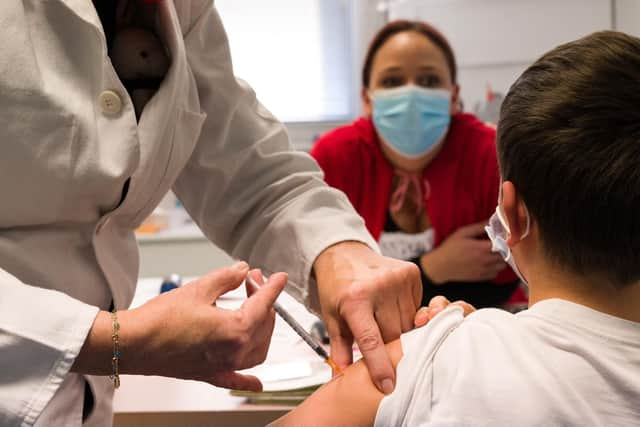Study has revealed why children are more protected from severe Covid than adults
The study, which compared Covid infection in adults and children across multiple organs, was released as the Pfizer/BioNTech coronavirus vaccine has been approved for use in vulnerable primary school children.
The Joint Committee on Vaccination and Immunisation (JCVI) updated its advice after the UK’s Medicines and Healthcare products Regulatory Agency (MHRA) approved the jab for five to 11-year-olds following a robust review of safety data.
Advertisement
Hide AdAdvertisement
Hide AdIn response to the Omicron variant, the committee has also advised that some older children be offered a booster dose.


A low-dose version of the vaccine has been approved for those aged five to 11 who are in a clinical risk group, or who are a household contact of someone, of any age, who is immunosuppressed. They should be offered a primary course of vaccination – typically two doses.
It is estimated around 330,000 children are said to fall within the new category eligible.
Researchers have meanwhile separately found a stronger innate immune response to Covid in the airways of children, characterised by the rapid deployment of interferons, helped to restrict viral replication early on.
According to the study, a less rapid immune response in adults meant the virus was better able to invade other parts of the body where the infection was harder to control.
Interferons tell nearby cells to tighten their defences when there are viral or bacterial threats.
They are proteins with strong anti-viral activity and their production will typically lead to the activation of B and T cells, which kill infected cells and prevent the pathogen from spreading further.
Part of the Human Cell Atlas, researchers suggest the findings will be a valuable contribution to predict personal risk from the virus.
Advertisement
Hide AdAdvertisement
Hide AdA nasal swab to measure the immune response in newly infected adults could be used to identify those at higher risk who may be candidates for pre-emptive monoclonal antibody treatment. Other research indicates inhalation of interferons could be a viable therapy.
The immune system people are born with is not the same as the one they have as adults.
Children have an innate immune system that is better able to recognise dangerous viruses or bacteria automatically, triggering cells that can adapt to the threat.
Researchers say adults have a more adaptive immune system containing a huge repertoire of memory type cells, which have been trained through past exposure to respond to a particular threat.
While the adult immune system also has an innate response, it is more active in children.
For this study, researchers at University College London (UCL) and affiliated hospitals collected and processed matched airway and blood samples from 19 paediatric and 18 adult Covid-19 patients with symptoms ranging from asymptomatic to severe, as well as control samples from 41 healthy children and adults.
Analysis showed interferons were more strongly expressed in healthy children compared to adults, with a more rapid immune response to infection in children’s airways.
This would help to restrict viral replication early on and give children an immediate advantage in preventing the virus from infecting the blood and other organs, researchers say.
Advertisement
Hide AdAdvertisement
Hide AdDr Masahiro Yoshida, a first author of the study from University College London, said: “Because Sars-CoV-2 is a new virus, it isn’t something that the adaptive immune system of adults has learned to respond to.
“The innate immune system of children is more flexible and better able to respond to new threats.
“What we see at a molecular level are high levels of interferons and a very quick immune response in children that helps to explain why they are less severely affected by Covid-19 than adults.”
The study also explains how the immune system of adults, with its high numbers of killer immune cells such as B and T cells, can work against the body once the virus has spread to other parts of a patient.
Dr Marko Nikolic, a senior author of the study from University College London, said: “Once the virus has spread to several areas of the body, organ damage can be caused by the immune system trying and failing to control the infection.
“Our study shows that not only do children respond better initially, if the virus does enter the blood the cytotoxic response is less forceful.”
Dr Kerstin Meyer, a senior author of the study from the Wellcome Sanger Institute, said: “To put it simply, the innate immune response is better at fighting Covid-19 and children have stronger innate immunity, but immunity is also a complex ballet involving many types of cells.
“The timing and the types of cells that are triggered will influence how an infection develops, and this will vary between individuals for all sorts of reasons in addition to age.”
Comments
Want to join the conversation? Please or to comment on this article.
